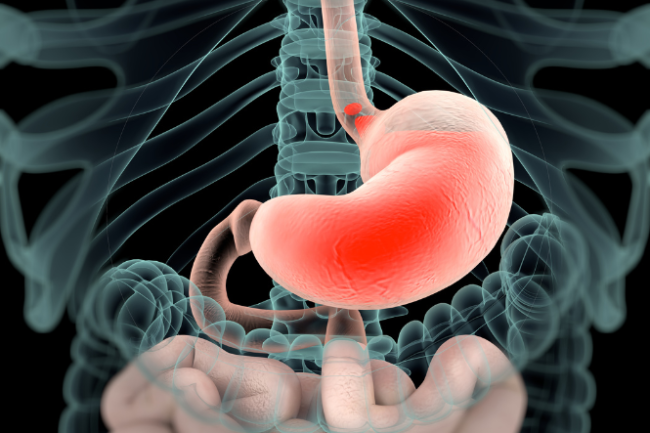You can now add Healthify as a preferred source on Google. Click here to see us when you search Google.
Gastro-oesophageal reflux (GORD)
Also known as acid reflux, or GERD
Key points about Gastro-oesophageal reflux disease (GORD)
- GORD is regurgitation of stomach contents into your food pipe or oesophagus. It's very common and may not cause symptoms.
- It may result in inflammation of the lining of your oesophagus (oesophagitis) due to stomach acid leaking up. This can damage the oesophagus lining.
- GORD is diagnosed when you have heartburn consistently or several times per week.
- A combination of medications and lifestyle changes are used to treat GORD.

After you swallow food, it travels down your oesophagus (food pipe or gullet – the tube between your throat and stomach) into your stomach. A ring of muscle, called the lower oesophageal sphincter, acts as a valve between your oesophagus and your stomach. This muscle should prevent stomach contents and acid from going back up your oesophagus.
GORD happens when the muscle doesn't work properly and it lets stomach contents and acid flow (reflux) back up into your oesophagus. If you have acid reflux often, it can lead to inflammation of the lining of your oesophagus. This is known as oesophagitis.
Video: Gastroesophageal reflux (GERD)
(Cleveland Clinic, US, 2019)
Heartburn is the main symptom of GORD. This is a burning feeling that rises up from your upper stomach or lower chest up towards your neck.
Other common symptoms include:
- pain in your upper abdomen or chest
- feeling sick (nausea)
- an acid taste in your mouth
- indigestion (dyspepsia)
- a burning pain when you swallow hot drinks.
These symptoms tend to be worse after a meal.
Less common symptoms caused by acid irritating the nearby windpipe include:
- a persistent cough, more common during the day
- wheezing
- mouth or throat symptoms such as gum problems, bad breath, sore throat or hoarseness
- chest pain which sometimes may be mistaken for a heart attack.

Image credit: Canva
One of the main risk factors for GORD is being overweight. As your body mass index (BMI) increases, so does your risk of developing GORD. This is thought to be due to extra pressure being put on the lower oesophageal sphincter by the weight resting on your stomach. Other risk factors include pregnancy, smoking, abnormalities of your oesophagus and eating certain foods.
Pregnancy
It’s common to get heartburn during later stages of pregnancy, when your womb pushes up against your stomach. This normally goes away at the end of the pregnancy.
Smoking
Nicotine can cause the muscles of the lower oesophageal sphincter to relax which may allow reflux to occur. GORD in smokers with a chronic persisting cough is also thought to be one of a number of factors contributing to the development of a hiatus hernia.
Abnormalities of the oesophagus (such as hiatus hernia)
A hiatus hernia occurs when the upper part of the stomach bulges through your diaphragm into the chest cavity. A hiatus hernia will affect the functioning of the lower oesophageal sphincter and may then lead to reflux of stomach contents, including acid and sometimes bile, into your oesophagus.
This is quite common and not necessarily harmful – up to 1 in 3 people have a hiatus hernia. Read more about hiatus hernia.
Eating certain foods
Foods that can make the symptoms of GORD worse include:
- spicy foods
- acidic fruits and vegetables, such as citrus or tomatoes
- mint or chocolate
- caffeine
- alcohol
- garlic and onions
- fried or fatty food.
See your healthcare provider if you continue to have heartburn regularly. To make a diagnosis of GORD, your healthcare provider will take your medical history and may conduct a physical examination. A diagnosis of GORD is highly likely if regular and ongoing heartburn is your main symptom. Your healthcare provider will talk to you about the best ways to manage it.
Investigations aren't usually needed, but medical tests may be required if treatment isn't effective or if there's concern about complications or other potentially serious symptoms such as weight loss, pain or difficulties when swallowing (dysphagia) or vomiting of blood.
It may then be important to work out how severe your GORD is or whether there's any damage to your oesophagus and/or other conditions to be concerned about.
Tests
Tests may include:
- A faecal (poo) antigen test for Helicobacter pylori, a bacteria which can lead to stomach inflammation and ulcers.
- An endoscopy – this involves having an endoscope (a flexible tube with a tiny video camera and light at one end) passed through your mouth down into your stomach to examine the lining of your digestive tract. This will show abnormalities of the lining of your food pipe and stomach and may show a hiatus hernia. If the results are normal, an endoscopy can't be used to confirm or rule out GORD.
- pH monitoring and manometry – this involves using a monitor (a thin tube with a sensor at one end) to measure acidity levels in your oesophagus and pressures in the sphincter muscle. This test isn't commonly done but may be done before surgery is considered or if there are concerns about the free flow of food or fluids in your food pipe.
- Barium swallow – this is when a chalky substance called barium is swallowed before an X-ray. As you swallow it, the barium coats the lining of your throat and oesophagus, and then the inside of your stomach and upper bowel, so they show up better on the X-ray. A barium swallow X-ray is only done if there are still concerns after several approaches to treatment have been tried.
There are a number of lifestyle changes you should try to help reduce heartburn and acid reflux.
- If you're overweight, try losing weight. Excess weight puts pressure on your stomach, causing acid to back up your oesophagus.
- Watch what you eat and how much you eat. Avoid foods that trigger your heartburn and try not to overfill your stomach.
- If you smoke, quit. Smoking and nicotine affects the functioning of the oesophageal sphincter/valve.
- If you vape, try to quit.
- Cut back on how much alcohol and caffeine you drink.
- Stay upright after a meal and use gravity to help keep stomach acid down.
- Wait at least 3 hours after eating before lying down or going to bed.
- If symptoms occur often or at night, raise the top end of your entire bed by 10cm (to lift your head slightly higher than your stomach). Propping yourself up just on pillows is less effective at it may increase the pressure in the middle of your abdomen (tummy).
- Avoid or reduce the use of non-steroidal anti-inflammatories (NSAIDs).
Apps reviewed by Healthify
You may find it useful to look at some Nutrition, exercise and weight management apps and Quit smoking apps.
If lifestyle changes haven't helped and if your reflux symptoms are frequent and bothering you, treatment should be used. If it's not treated, acid reflux may eventually damage your oesophagus and create other complications.
There are 3 main types of medicines used to treat GORD. The type of medicine prescribed depends on how severe your symptoms are. These medicines are antacids (with or without alginates), proton pump inhibitors and H2-receptor blockers (rarely used).
- Antacids neutralise stomach acids and provide rapid relief of symptoms – especially if your condition is mild. Some antacid medicines also contain alginates, which are substances that may form a type of raft on top of your stomach contents. This may not stop food and acid from refluxing, but will make it less acid and therefore less irritating. Antacids don't help to heal oesophageal damage or prevent heartburn from happening again. Antacid brands include Mylanta, Eno, Quick-Eze and Gaviscon. Antacids may be prescribed or bought over the counter with advice from your pharmacist. Sucralfate works differently by reducing the concentration of pepsin, one of the substances involved in digestion, and then forming a barrier for the lining of your stomach. It's more commonly used when treating stomach ulcers.
- Proton pump inhibitors (PPIs) block stomach acid production and help to heal your oesophagus. They're recommended as a first choice for severe GORD symptoms if other approaches haven't worked. They include omeprazole, pantoprazole and lansoprazole. If a PPI is prescribed for you it's important to take them daily, and 30 minutes before eating, for them to work properly. Read more about proton pump inhibitors.
- H2-receptor blockers reduce the production of stomach acid and can provide relief – especially if you have less severe GORD. They are slower acting than antacids and less effective than PPIs but may provide longer lasting relief than antacids. This treatment may allow your oesophagus to heal and relieve your symptoms entirely. The only available H2-receptor blocker in Aotearoa New Zealand is famotidine. Proton pump inhibitors are the preferred first choice if a regular medication is prescribed.
Medicines to speed up the transit of food and fluids in your stomach, such as metoclopramide or domperidone, can be used if there are concerns that your stomach isn't emptying properly and leading to reflux.
After your oesophagus has had a chance to heal and your symptoms improve, the strength of medicine prescribed will be reduced. Eventually you may only need to take medicine when you have symptoms. For some people with severe GORD, the lowest effective dose of medicine may need to be continued.
If you have Helicobacter pylori bacteria in your stomach, this can be treated with a 14 day course of 2 antibiotics and a proton pump inhibitor.
Medicines are effective in treating GORD but they are only part of the solution. To help prevent symptoms of GORD recurring, you may need to make some important lifestyle changes.
Other treatment options
If lifestyle changes and treatments haven't been effective, you may be referred to a specialist (gastroenterologist). It will then be important to confirm the diagnosis by completing investigations, look for complications and ruling out other conditions such as stomach problems.
If you have severe ongoing symptoms, or can't tolerate treatment, surgery may be considered. Different operations or endoscopic procedures are possible for some people.
A few people with ongoing significant inflammation of the food pipe (oesophagitis) may develop a condition called Barrett’s oesophagus. This is where the microscopic lining of your gullet changes and it can eventually lead to cancer of the oesophagus. If a diagnosis of Barrett’s oesophagus has been made, you'll need to be monitored regularly by a specialist and check-up endoscopies will be required.
Acid reflux and oesophagitis(external link) PatientInfo, UK
Brochures
Reflux(external link) Gastroenterological Society of Australia
Apps
Nutrition, exercise and weight management apps
Quit smoking apps
References
- Dyspepsia and Heartburn/GORD(external link) Auckland Region Community HealthPathways, NZ, 2025
- Gastro-oesophageal reflux disease and dyspepsia in adults – investigation and management(external link) NICE, UK, updated 2019
- Katz PO, Dunbar KB, Schnoll-Sussman FH, et al. Clinical guideline for the diagnosis and management of gastroesophageal reflux disease Am J Gastroenterol. 2022;117(1):27–56
Gastro-oesophageal reflux disease and dyspepsia in adults – investigation and management(external link) NICE, UK, updated 2019
Katz PO, Dunbar KB, Schnoll-Sussman FH, et al. Clinical guideline for the diagnosis and management of gastroesophageal reflux disease Am J Gastroenterol. 2022;117(1):27–56
Educational series on gastro-oesophageal reflux disease (GORD) management [PDF, 428 KB] Research Review, NZ, 2020
Stopping proton pump inhibitors in older people(external link) BPAC, NZ, 2019
Credits: Healthify editorial team. Healthify is brought to you by Health Navigator Charitable Trust.
Reviewed by: Dr Roland Meyer, Specialist Physician, Respiratory and General Medicine
Last reviewed:
Page last updated:





